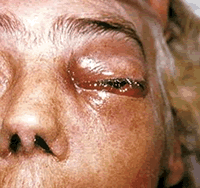Absidia

Absidia species are ubiquitous in most environments.
They are often associated with warm decaying plant matter, like in compost piles.
The best known species is the pathogenic Absidia corymbifera, which causes zygomycosis, especially in the form of mycotic spontaneous abortion in cows. Zygomycosis is the broadest term that refers to infections caused by bread mold fungi. However, because zygomycota has been identified as polyphyletic and is not included in modern fungal classification systems, the diseases that Zygomycosis cause are better referred to as the specific name mucormycosis.
Absidia is an allergenic that could cause mucorosis in individuals with low immunity. Most people come into contact with this fungal species regularly and it poses no health concern. If this fungus breeds infection, it can be a serious and potentially life-threatening fungal infection. It typically affects the face or oropharyngeal (nose/mouth) cavity, but it can also infect the lungs, nose, brain, eyesight and skin.
